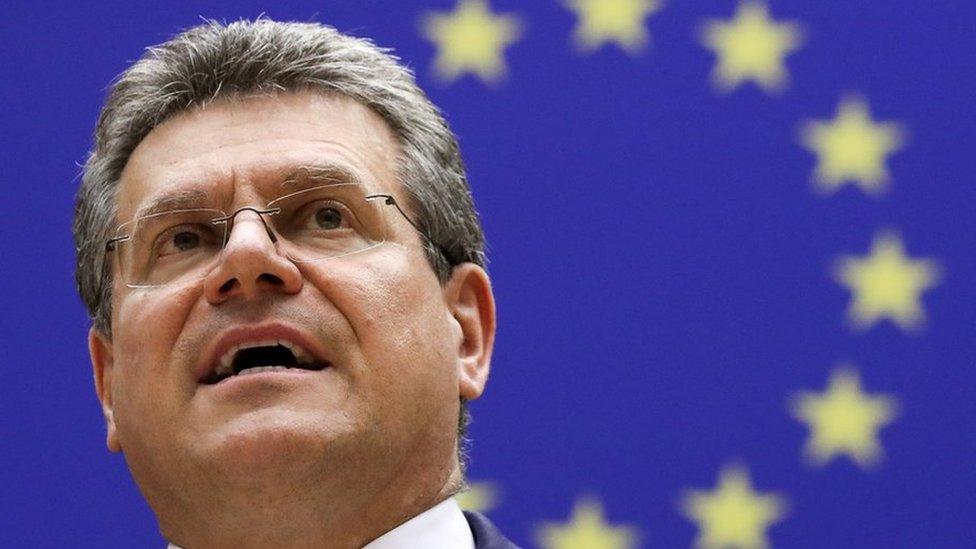Irish Sea Border Checks: How did we get here?
- Published
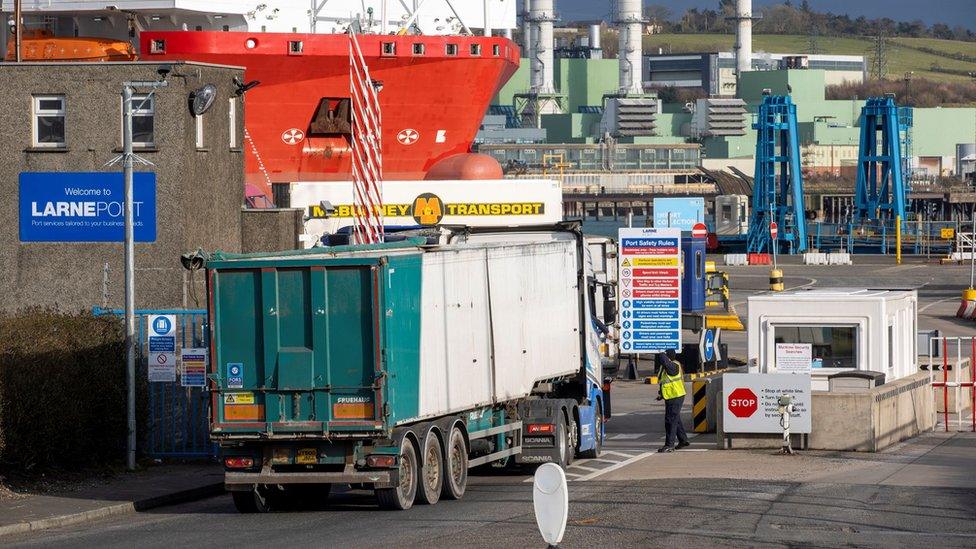
Despite an order by a Democratic Unionist Party minister for checks at the Irish Sea Border to stop, Downing Street say they are continuing.
Northern Ireland's Agriculture Minister Edwin Poots had ordered checks to stop from 00:01 GMT on Thursday.
The checks are required as part of a Brexit deal, known as the Northern Ireland Protocol.
Since it came into force at the start of 2021 the protocol has disrupted trade between Great Britain and Northern Ireland.
This move comes as the BBC understands Northern Ireland's First Minister Paul Givan intends to announce his resignation later.
BBC News NI charts how we got to this point.

1 January 2021: The Irish Sea border comes into effect
The end of the Brexit transition period sees the Irish Sea border come into effect.
It's a result of the Northern Ireland Protocol - the part of the Brexit deal which keeps Northern Ireland in the EU's single market for goods.
This avoids the need for checks on the physical border between Northern Ireland and the Republic of Ireland.
The first freight checks required under the terms of Brexit's economic sea border between Great Britain and Northern Ireland begin taking place at NI ports.
These are undertaken in temporary facilities at the ports as permanent facilities are being built.

Mid-January 2021: NI experiences some shortages in products
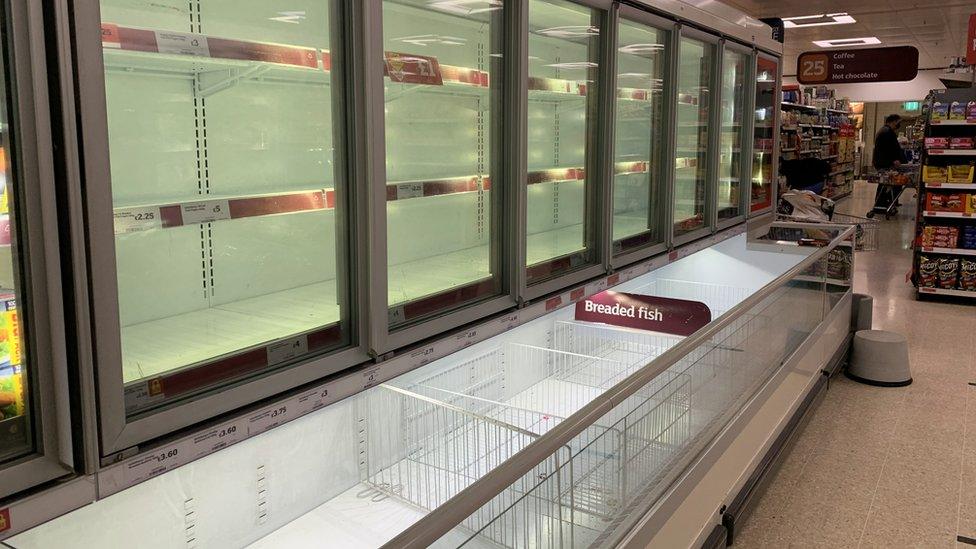
This supermarket in Northern Ireland experienced some empty shelves in January
Some companies are struggling to deal with the requirements of the new Irish Sea border.
That is leading to temporary shortages of some products in a growing number of Northern Ireland supermarkets.
The UK government says the flow of goods between Great Britain and Northern Ireland has been smooth overall.

1 February 2021: Checks suspended at ports

Environmental health workers were temporarily removed from inspection checks
Northern Ireland's agriculture department suspends some post-Brexit food checks at Larne and Belfast ports after a local council withdrew staff over concerns for their safety.
The environmental health workers are temporarily removed from inspection checks at the ports over "fears for their security".
The Department for Agriculture, Environment and Rural Affairs (DAERA) said it is also temporarily suspending physical inspections of products of animal origin at Larne and Belfast.

5 February 2021: Council staff resume inspections
Mid and East Antrim Council says its 12 environmental health officers are returning to work after it received a threat assessment from police.
The department said on 5 February the decision to return was taken following a "full threat assessment from the PSNI".

6 February 2021: Trade unions dispute threat claims
Trade unions Nipsa, Unite and GMB distance themselves from Mid and East Antrim Council's account of alleged threats to workers.

7 February 2021: No credible threats say PSNI

Chief Constable Simon Byrne says there is no evidence of "credible threats" against port workers in Larne or Belfast.
He says Mid and East Antrim Council's decision to withdraw staff was taken by "people outside of the purview of policing".
Full story: Why were Northern Ireland port checks suspended?

27 February 2021: DUP minister orders Brexit check construction halt
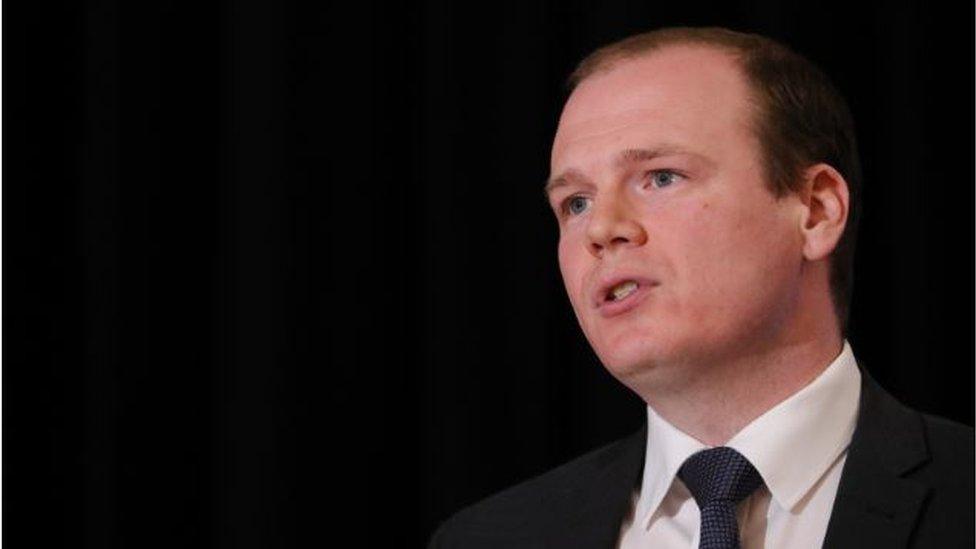
Gordon Lyons says the move was due to "practical difficulties" caused by the Northern Ireland Protocol
Northern Ireland's then Democratic Unionist Party (DUP) agriculture minister Gordon Lyons orders officials to stop work on new permanent border control posts (BCPs).
Mr Lyons says he was responding to "practical difficulties" caused by the Northern Ireland Protocol. He also asks officials to stop recruiting BCP staff.
Other ministers question his authority to make such a decision.
The DUP argues that it is responding to trade difficulties caused by the protocol.
Existing temporary BCPs continue to operate.

30 June 2021: Sir Jeffrey Donaldson elected leader of DUP
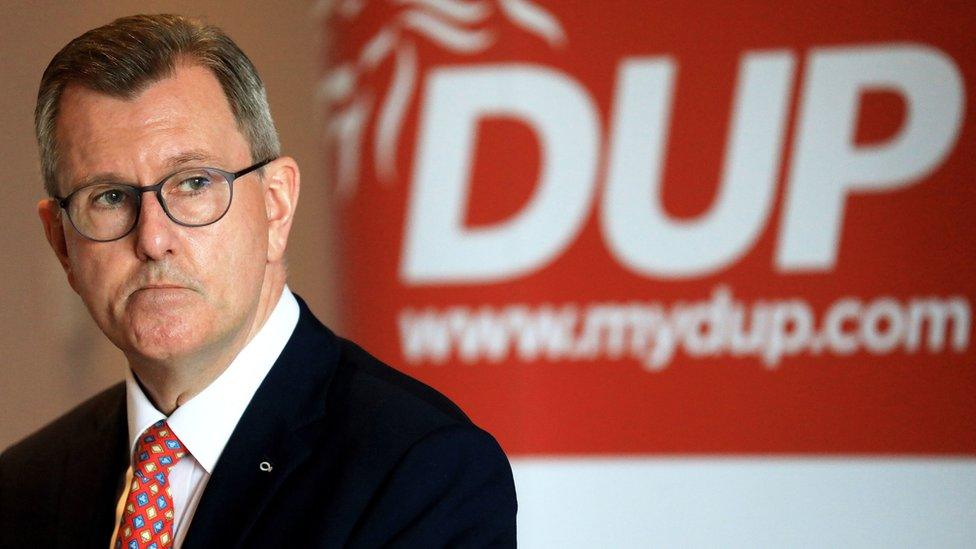
Sir Jeffrey Donaldson is elected as leader of the Democratic Unionist Party.
He calls on the UK government to set out a timetable for how and when changes will be made to the Northern Ireland Protocol.

19 July 2021: DUP leader calls for renegotiation of Brexit deal
Both the UK government and the EU must re-negotiate the Brexit deal because the Northern Ireland Protocol has not worked, Sir Jeffrey said.
Sir Jeffrey Donaldson was speaking after a virtual meeting with European Commission Vice-President Maros Šefčovič.

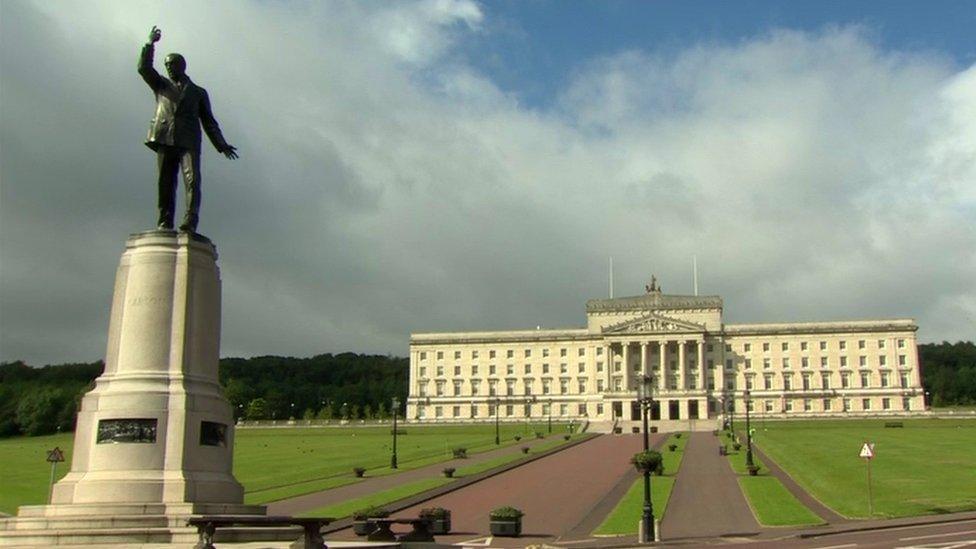
9 September 2021: DUP 'may quit Stormont within weeks'
The Democratic Unionist Party could exit the Stormont Executive if its demands over the Northern Ireland Protocol are not met, the DUP leader says.

19 December 2021: Foreign Secretary Liz Truss replaces Lord Frost
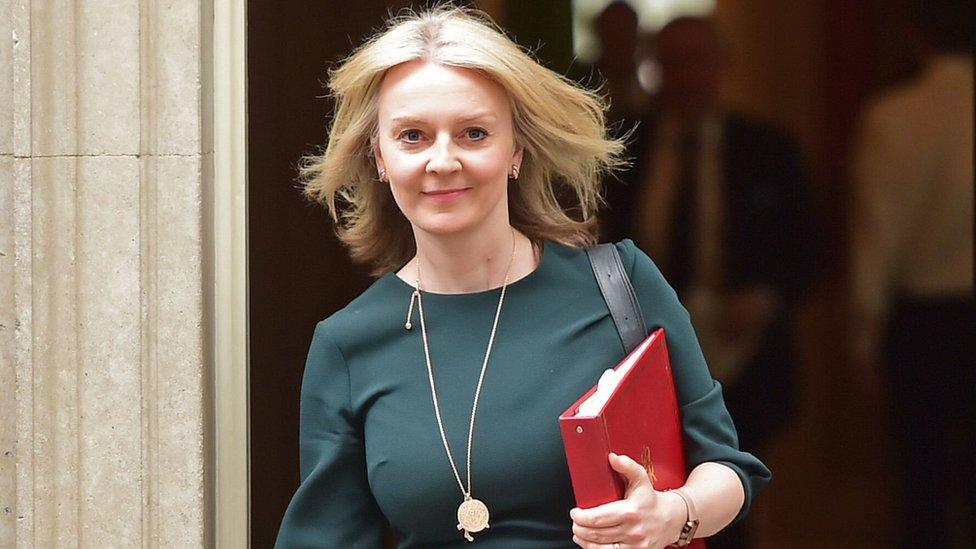
Foreign Secretary Liz Truss replaces Lord Frost as the UK's lead negotiator with the EU in post-Brexit talks.
Lord Frost had most recently been engaged in negotiations with the EU over post-Brexit arrangements.
This included elements of the Northern Ireland Protocol, agreed by the UK and EU in 2019, that allows goods to cross the border between Northern Ireland and the Republic of Ireland without checks.
During the course of negotiations with the EU, Ms Truss says she would be "willing" to override the Northern Ireland part of Brexit deal and use Article 16 if necessary.
Article 16 is the part of the deal that allows the UK or the EU to take unilateral "safeguard" measures if the deal is leading to serious practical problems.

26 January 2022: DUP reiterates threat to collapse Stormont
Sir Jeffrey warns that if the government fails to take decisive action over the Northern Ireland Protocol then his party will act.

2 February 2022: DUP minister orders Irish Sea border checks to be halted
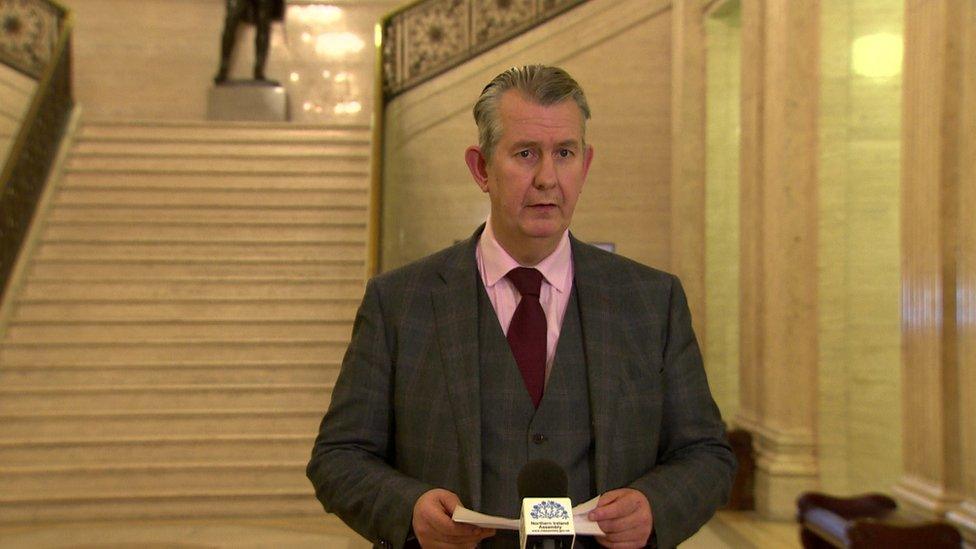
Mr Poots said he had received legal advice on Wednesday
Edwin Poots announces officials in his department have been instructed to no longer enforce checks along the Irish Sea border.
He later says the move comes after legal advice, given by former Northern Ireland attorney general John Larkin, indicated he could direct the checks to stop in the absence of executive approval for them.
Despite this, a prime minister's spokesman said checks were continuing on Thursday, and that "we are reviewing the legal position".

3 February 2022: First Minister Paul Givan, of the DUP, announces his resignation from office.
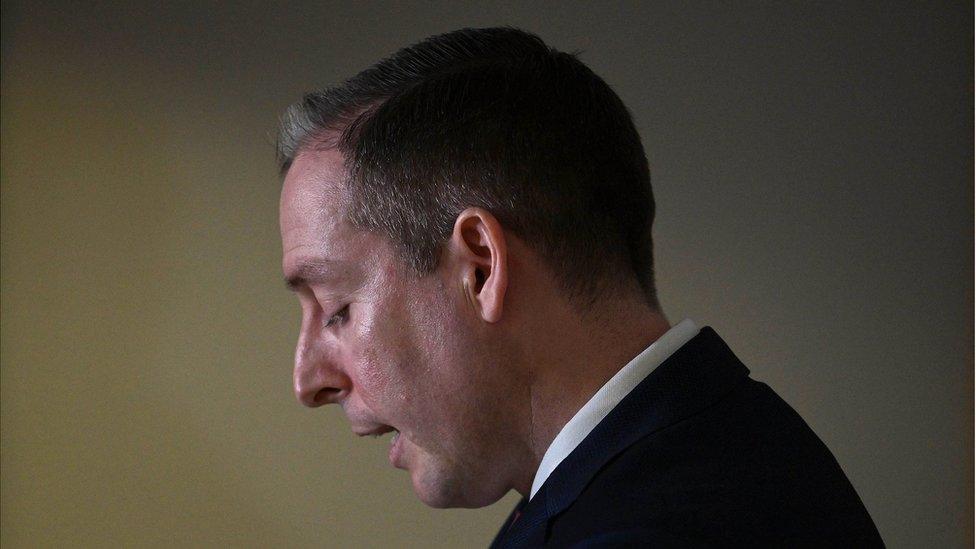
Paul Givan says the power-sharing institutions in Northern Ireland were being tested
Mr Givan's resignation automatically means Deputy First Minister Michelle O'Neill, of Sinn Féin, also loses her position.
Sinn Féin called for an early assembly election as a result.

- Published27 January 2022
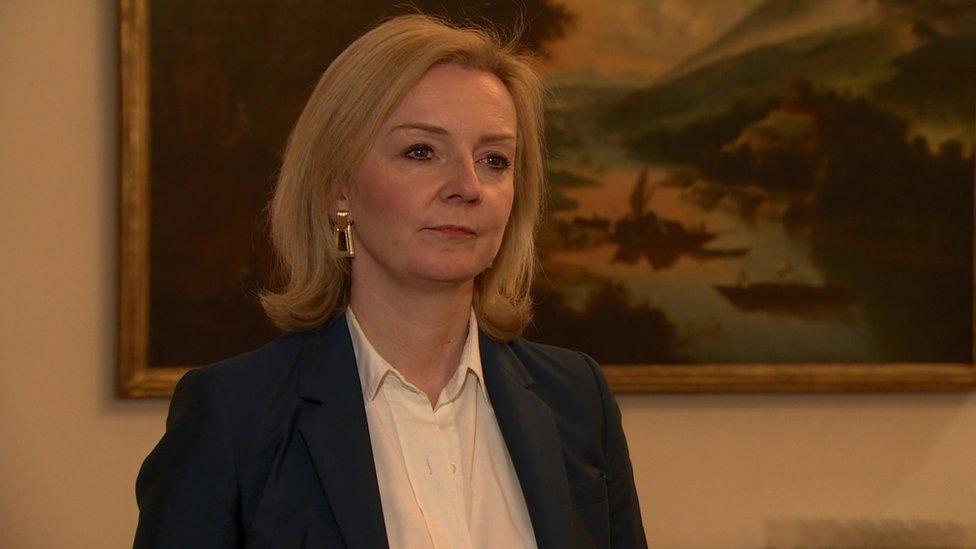
- Published26 January 2022
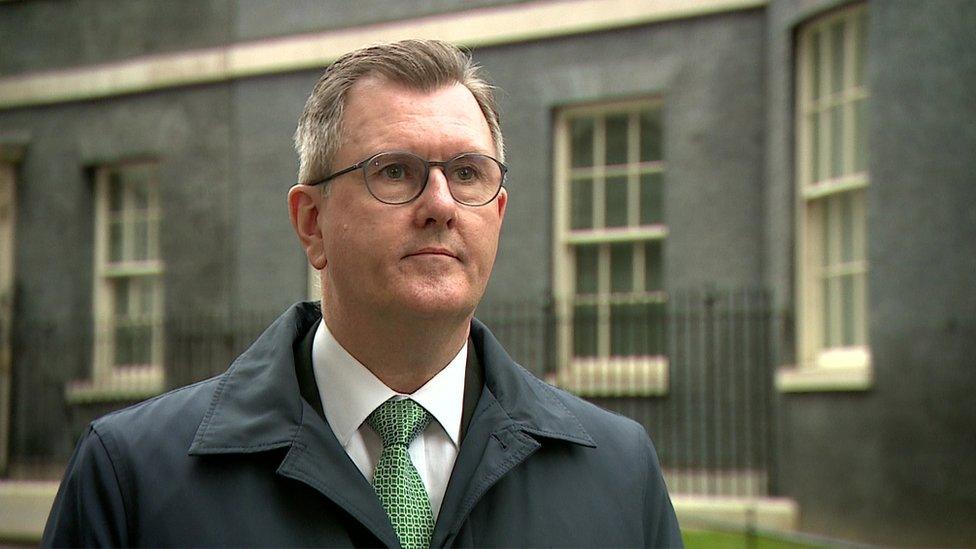
- Published24 January 2022
